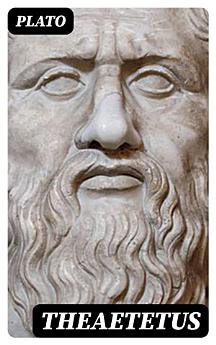Theaetetus
sep. 2022 · DigiCat
Rafbók
162
Síður
family_home
Gjaldgeng
info
reportEinkunnir og umsagnir eru ekki staðfestar Nánar
Um þessa rafbók
Plato's "Theaetetus" is a profound dialogue that delves into the nature of knowledge, probing the question, "What is knowledge?" Through an engaging conversation between Socrates and the young mathematician Theaetetus, Plato presents a captivating exploration of epistemology, offering three notable definitions of knowledge: perception, true belief, and justified true belief. The narrative is marked by its Socratic method, characterized by dialectical reasoning and critical interrogation, which invites readers into the philosophical inquiry that remains relevant in contemporary discussions of knowledge and belief. Plato, a pivotal figure in Western philosophy, deeply influenced by Socratic dialogues and the intellectual currents of Ancient Greece, penned "Theaetetus" during a period of rich philosophical discourse in Athens. His background as a student of Socrates and his engagement with mathematics and metaphysics shaped his exploration of knowledge, revealing the tensions between perception and reality. Plato's philosophical ambitions aimed not only to define knowledge but also to encourage readers to critically examine their own epistemic foundations. "Theaetetus" is an essential read for anyone intrigued by the philosophical pursuits of understanding knowledge in its multifaceted dimensions. Scholars, students, and casual readers alike will find value in Plato's rigorous examination of epistemology, which resonates across millennia, bridging ancient philosophy with modern thought. This dialogue is not merely a historical artifact; it is a vital text that continues to challenge and inspire philosophical inquiry.
Um höfundinn
Plato, the eminent philosopher of ancient Greece, lived from approximately 428/427 BCE to 348/347 BCE. As a disciple of Socrates and a mentor to Aristotle, Plato's contributions laid the groundwork for Western philosophy and science. His works are written in the form of dialogues, in which characters engage in philosophical discussions, a literary form that he effectively popularized. In 'Theaetetus', one of his prominent dialogues, Plato delves into the nature of knowledge, exploring complex themes such as perception, reasoning, and epistemology. The dialogue presents Socrates in conversation with a young mathematician named Theaetetus, examining the question 'What is knowledge?' This dialogue, like many others penned by Plato, demonstrates his skill in blending dramatic elements with deep philosophical inquiry. Through his Academy in Athens, the first institution of higher learning in the Western World, Plato's influence extended well beyond his lifetime. His philosophical insights continue to be a cornerstone of philosophical education, with enduring relevance to metaphysics, ethics, and epistemology.
Gefa þessari rafbók einkunn.
Segðu okkur hvað þér finnst.
Upplýsingar um lestur
Snjallsímar og spjaldtölvur
Settu upp forritið Google Play Books fyrir Android og iPad/iPhone. Það samstillist sjálfkrafa við reikninginn þinn og gerir þér kleift að lesa með eða án nettengingar hvar sem þú ert.
Fartölvur og tölvur
Hægt er að hlusta á hljóðbækur sem keyptar eru í Google Play í vafranum í tölvunni.
Lesbretti og önnur tæki
Til að lesa af lesbrettum eins og Kobo-lesbrettum þarftu að hlaða niður skrá og flytja hana yfir í tækið þitt. Fylgdu nákvæmum leiðbeiningum hjálparmiðstöðvar til að flytja skrár yfir í studd lesbretti.







